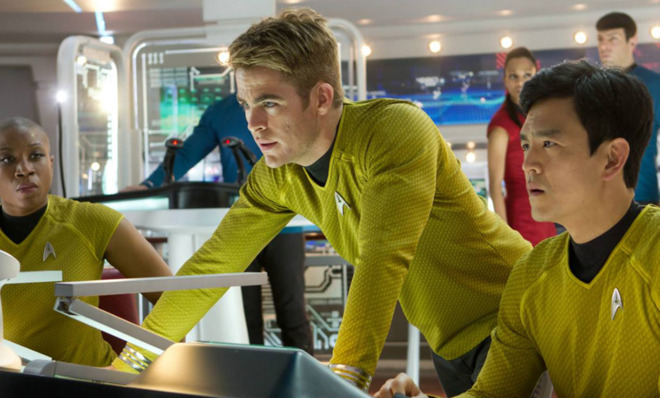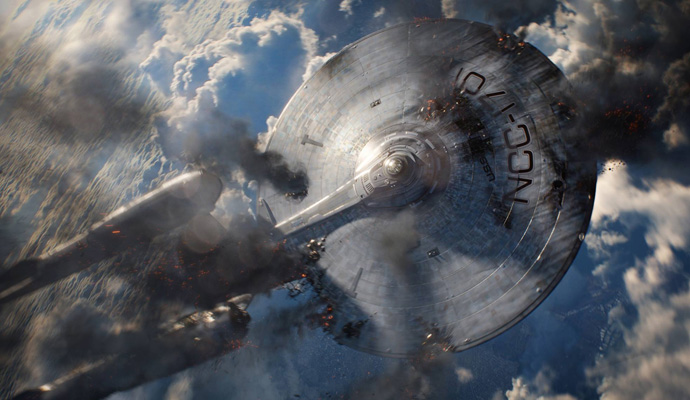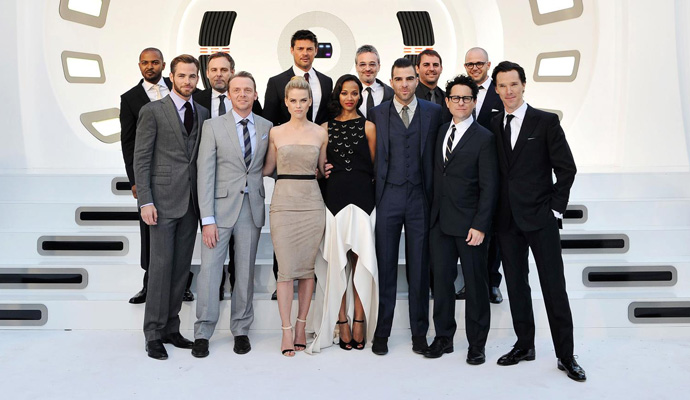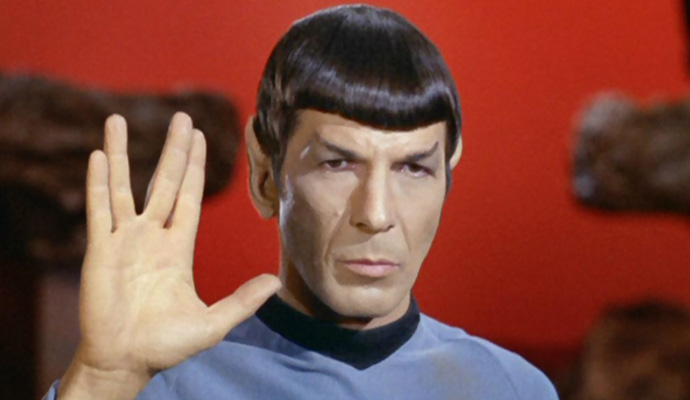How the next Star Trek movie can surpass Star Wars: Episode VII
Star Trek Into Darkness was a frustrating misfire. It's not too late for the film's producers to steady their aim.


A free daily email with the biggest news stories of the day – and the best features from TheWeek.com
You are now subscribed
Your newsletter sign-up was successful
It's hard to call Star Trek Into Darkness — the highest-grossing movie in the history of the Star Trek franchise — a failure. But I'm going to do it anyway.
Almost everything that was exciting and refreshing about 2009's Star Trek reboot was jettisoned for this year's sequel, which offered a grimmer, dumber retelling of 1982's Star Trek: The Wrath of Khan without any of the original's wit or conviction. After just two movies, the rebooted Star Trek franchise was suddenly in danger of becoming creaky and generic — and under different circumstances, J.J. Abrams' decision to franchise-jump over to the upcoming Star Wars: Episode VII might have been the kiss of death. (Abrams will stay on as a producer for the next Star Trek movie.)
But the more I've thought about it, the more I'm convinced that Abrams' departure is the best thing that could happen to the Star Trek franchise. A recent, promising report claims that Attack the Block director Joe Cornish is the favorite to take over the director's chair for the as-yet untitled third film in the series. Cornish would be an ideal choice for the movie — a relatively fresh talent with one brilliantly idiosyncratic sci-fi movie already under his belt. It's the same approach Marvel has employed for upcoming movies like James Gunn's Guardians of the Galaxy, and that Universal is employing to reboot the Jurassic Park franchise with Colin Treverrow's Jurassic World. By contrast, Star Wars has J.J. Abrams: An undeniably talented director, but the safest choice imaginable to shepherd a blockbuster sci-fi franchise into the future. We know what a big-budget J.J. Abrams blockbuster looks like. Without him, Star Trek is likely to go somewhere it's never gone before.
The Week
Escape your echo chamber. Get the facts behind the news, plus analysis from multiple perspectives.

Sign up for The Week's Free Newsletters
From our morning news briefing to a weekly Good News Newsletter, get the best of The Week delivered directly to your inbox.
From our morning news briefing to a weekly Good News Newsletter, get the best of The Week delivered directly to your inbox.
It's a hopeful sign for the long-term future of the Star Trek franchise — but it's only the first major step they'll need to take. If Star Trek is going to go toe-to-toe with Star Wars in the years to come, there are a few things the upcoming sequel's creative team should consider as they're mapping out their plan for part three:
1. Narrow the scope

Star Trek Into Darkness shared an unfortunate quality with several of this summer's other blockbusters: The sudden shift to earth-shattering blockbuster drama, as Khan crashed a spaceship into San Francisco in the film's climactic sequence. The scene shifted the film from a relatively character-intensive movie into ultra-generic blockbuster territory — and screenwriter Damon Lindelof stopped just short of admitting as much in an interview with Vulture:
Once you spend more than $100 million on a movie, you have to save the world. And when you start there, and basically say, I have to construct a MacGuffin based on if they shut off this, or they close this portal, or they deactivate this bomb, or they come up with this cure, it will save the world — you are very limited in terms of how you execute that. […] Did Star Trek Into Darkness need to have a gigantic starship crashing into San Francisco? I'll never know. But it sure felt like it did. [Vulture]
A free daily email with the biggest news stories of the day – and the best features from TheWeek.com
Star Wars, with its planet-destroying Death Star, helped to create the expectation that Lindelof is talking about — but there is another way. How can the creative team behind Star Trek 3 resist the urge to put the entire Earth in danger once again? Fortunately, the conclusion of Star Trek Into Darkness provides our answer: Get away from the Earth altogether. Into Darkness ended as the Enterprise left for a five-year exploratory mission. Great idea! Explore strange new worlds. Seek out new life and new civilizations. The threats don't need to be global, or even universal — we care about these characters, and the possibility of their deaths is dramatic enough. And while we're on the subject:
2. Gut the main cast

You know what would have made Star Trek Into Darkness stand out in the sludgy glut of 2013's summer blockbuster season? Killing Captain Kirk and keeping him dead. For good.
It might sound like blasphemy, but it briefly looked like Star Trek might kill off its main character at the climax of Into Darkness — and it's all the more maddening because the film was so close to getting it right. From its opening scene, Star Trek Into Darkness took great pains to show that Kirk isn't all that great a captain yet. Kirk's truly heroic, selfless moment comes with his "death" later in the movie, which sends Spock on an emotional rampage. From the moment Spock yells "KHAAAAANNN," it's easy to imagine a version of the story where a suddenly illogical Spock finds and kills Khan, takes command of the Enterprise, and leads its sadder, wiser crew onto its next mission in Star Trek 3. That's the kind of arc that would have molded Spock into a man newly committed to becoming the Starfleet captain Kirk never lived to become, and given Kirk a final redemptive arc that echoed his own father's tragic sacrifice.
Unfortunately, that's not the story Into Darkness told. Instead, Kirk was quickly resurrected by ridiculous deus ex machina: Khan's blood, which possesses inexplicable regenerative properties. The broader implications for the franchise are not good. Star Trek now exists in a world in which Khan's magic blood can theoretically resurrect anyone who dies, which makes the stakes for any character death exponentially lower — and with Khan cryogenically frozen in Starfleet custody, I don't see any reason why their scientists wouldn't start drawing and distributing his magic blood to every infirmary in the fleet.
There's no easy fix for a storytelling mistake that big, so if I was writing Star Trek 3, I would just pretend it never happened — and spend the next movie making sure that viewers have no confusion about the life-or-death stakes of the missions embarked upon by the crew of the U.S.S. Enterprise. It's time for Star Trek to kill off a main crew member, and no one — not even Kirk and Spock — should be considered non-expendable. Yes, this is our main cast, but that's kind of the point — their deaths would matter. Star Wars brings back dead heroes as Force Ghosts; Star Trek could treat their deaths as tragic and irreversible instead. And it would require the next film's writers to do more than ape a previous story in the franchise; there are, after all, a whole universe of possibilities that deserves to be explored. Which is also why they should:
3. Launch a new Star Trek TV series

It's been less than a decade since Star Trek: Enterprise bowed on television, but since then, the entire franchise has been transformed by the advent of the 2009 reboot — so why don't we have a Star Trek on the small screen right now?
Unlike Star Wars, Star Trek started on the small screen, and TV is the one medium where the series has reliably beaten its rival sci-fi franchise in both quality and viewership. The success of shows like Agents of S.H.I.E.L.D., which is set in the Marvel universe, have shown that modern audiences can't get enough of dense, interconnected, cross-medium stories. And from a more mercenary perspective, the possibilities for synergy are enormous; Marvel recently announced that next week's Agents of S.H.I.E.L.D. episode will tie in to Thor: The Dark World, simultaneously boosting the profile of both the movie and the show.
There are very few contemporary franchises that are big enough and deep enough to support that density of storytelling — but Star Trek happens to be one of them, and the opportunities for non-Enterprise stories set in the same universe are virtually limitless. Why not give us a new ship and captain to follow? Why not a show set at Starfleet Academy? Why not a miniseries about the Eugenics Wars? Why not an anthology series that offers a totally new story set in the Star Trek universe every week?
Fortunately, there are (very) early rumblings that a new Star Trek series may be in the cards: A tweet by entertainment reporter Joe Michalczuk said that Star Trek screenwriter Roberto Orci told him he'd had a meeting with CBS to discuss reviving the franchise on television. It's way, way too early to get excited about it, but it is a promising sign that — with or without Abrams in the director's chair — there are still strong hands ready to guide the Star Trek franchise in the years to come. Into Darkness was a misfire, but it's not too late for the franchise to steady its aim.
Scott Meslow is the entertainment editor for TheWeek.com. He has written about film and television at publications including The Atlantic, POLITICO Magazine, and Vulture.
-
 How to Get to Heaven from Belfast: a ‘highly entertaining ride’
How to Get to Heaven from Belfast: a ‘highly entertaining ride’The Week Recommends Mystery-comedy from the creator of Derry Girls should be ‘your new binge-watch’
-
 The 8 best TV shows of the 1960s
The 8 best TV shows of the 1960sThe standout shows of this decade take viewers from outer space to the Wild West
-
 Microdramas are booming
Microdramas are boomingUnder the radar Scroll to watch a whole movie
